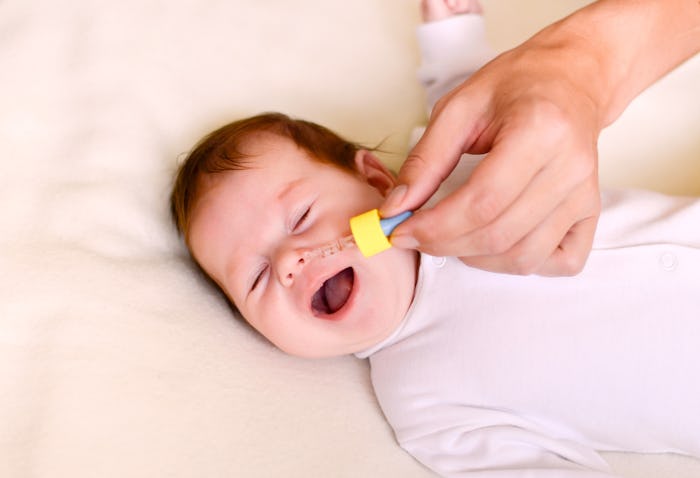Life

Is Flavoring Baby Medicine OK?
As Mary Poppins claimed, a "spoonful of sugar helps the medicine go down." But when your baby is sick and needs meds in real life, it's perfectly valid to wonder, is flavoring baby medicine OK? When it's 3 a.m. and you haven't gotten any sleep because of a sick baby, you're likely to do anything to get your little one to take his or her medicine and settle down. But is adding a "spoonful of sugar" really the best move? A study conducted by the Eunice Kennedy Shriver National Institute of Child Health and Human Development looked at this very issue. While the results of this study suggested that flavoring medicine does not impact the effectiveness of medicine, the study also concluded that adding flavor didn't completely mask the bitterness of all meds, especially strong drugs. Additionally, the doctors concluded that adding sugar or sugar substitutes to baby medication might make your kid a sugar addict (or at least crave sugar) when many parents try to limit sugar intake in young children with developing taste buds.
Babies are intuitive, so even before your kid hits the toddler stage he or she might fight you on taking medicine. Why? Well, you know that babies, even at a young age, seem to have their own agenda. And according to Woman's Day, infants are born with taste buds that innately favor sweet and reject bitter tastes. So, even an infant is likely to spit up medicine because his or her taste buds are "rejecting" it. And as the former Surgeon General C. Everett Koop said, "drugs don’t work in patients who don’t take them." The World Health Organization cited this famous quote in a study that looked at the relationship between health professionals, the pharmaceutical industry, and patients. Still, when you've got a sick baby and you're pulling your hair out, it's totally understandable to reach for something to help your baby not "reject" meds. Of course you should consult with your pediatrician before doing anything to your baby's medicine. But, you might not have to resort to such lengths with these tips to help you get that medicine down.
1Swaddle An Infant
According to Parents, you should swaddle your infant to keep his or her hands from swatting at the medicine.
2Use A Special Tool
Baby Center suggested that you use a tool that's basically a cup (which holds the medicine) attached to a pacifier to help baby ingest the medication easily.
3Use An Oral Syringe
Baby Center also suggested using an oral syringe because not only can you accurately measure the dosage, you can aim the oral syringe at your baby's cheek, so he or she is more likely to swallow the medicine.
4Act Like Medicine Is Delicious
For impressionable toddlers, if you act like medicine is the best thing since chocolate milk, your tot might just fall for the ruse. Remember, he or she looks to you for, like, everything.
5Numb Your Baby's Tongue With Ice Before Administering Meds
Parents suggested that you numb your kid's tongue with an ice cube or ice pop to deactivate the taste buds a bit before administering the medicine.
6Let Your Toddler Take Control Of Administering Medicine
The same Parents article pointed out that toddlers love to feel in control. So, rather than forcing your kid to take medicine, ask how he or she would like the medicine served. Hey, it might work. Just think about how Starbucks changed the coffee game by basically doing the same thing.
7Check With Your Pediatrician About How The Medicine Needs To Be Taken
OK, before you add any flavoring or chill your kid's meds, or hide medicine in food or drink, be sure to check with your pediatrician. Some medications need to be taken on a full stomach, while others on an empty stomach. Some medications might become less effective if chilled or diluted. I'm no doctor, so I can't advise you. But your pediatrician sure can. And trust me, you're not going to be the first parent to ask this question, so don't worry your savvy self, especially when it comes to your baby's health.